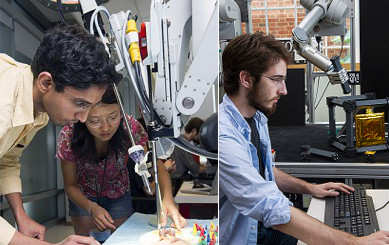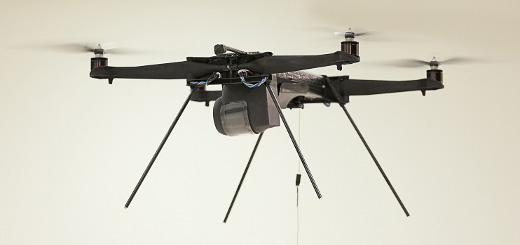Georgia Tech robotics program secures $2.3M in NSF awards
Georgia Tech, already among the leaders in robotics research, has some new projects to be excited about thanks to the National Science Foundation. According to the school’s Center for Robotics and Intelligent Machines, NSF recently awarded nearly $2.3 million to fund four Georgia Tech robotics projects.
Three of the projects received funding through the National Robotics Initiative, which President Obama launched two years ago to accelerate the development of robots that work beside people. A fourth was funded through the NSF’s Robust Intelligence program, which the NSF’s website says “advances and integrates the research traditions of artificial intelligence, computer vision, human language research, robotics, machine learning, computational neuroscience, cognitive science, and related areas.”
The projects, as described by Georgia Tech, are:
- “Learning from Demonstration for Cloud Robotics” — Led by School of Interactive Computing Associate Professor Andrea Thomaz, this project received $426K and aims to leverage cloud computing to enable robots to efficiently learn from remote human domain experts.
- “Understanding Neuromuscular Adaptations in Human-Robot Physical Interaction for Adaptive Robot Coworkers” — Led by School of Mechanical Engineering Assistant Professor Jun Ueda, this research focuses on developing theories, methods, and tools to understand the mechanisms of neuromotor adaptation in human-robot physical interaction. Associate Professor Minoru Shinohara (School of Applied Physiology) and Assistant Professor Karen Feigh (School of Aerospace Engineering) serve as co-PIs on the project, which received almost $1.2M.
- “Don’t Read My Face: Tackling the Challenges of Facial Masking in Parkinson’s Disease Rehabilitation through Co-Robot Mediators” — Led by College of Computing Associate Dean & Regents’ Professor, Ronald Arkin, this project received almost $580K and has two primary goals: 1) developing a robotic architecture endowed with moral emotional control mechanisms, abstract moral reasoning, and theory of mind sensitive to human affect and ethics; and 2) creating a specific architecture for a robot to mediate communication barriers between caregivers and patients with Parkinson’s disease who experience “facial masking,” or lack of recognizable emotion.
- “Bioinspired Collaborative Sensing with Novel Gliding Robotic Fish” (which received more than $83K from the NSF’s Robust Intelligence program) — Led by School of Electrical & Computer Engineering Associate Professor Fumin Zhang, the research aims to establish a theoretical framework and provide an enabling technology for robust underwater collaborative sensing with small, inexpensive robots.
“Georgia Tech faculty have a strong tradition of exceptional research and a robust interdisciplinary focus,” Henrik Christensen, KUKA Chair of Robotics and director of the Robotics and Intelligent Machines Center, said in a statement. “I’m extremely proud of and continually impressed with the contributions our researchers make to advancing robotics.”
According to the university, robotics research at Georgia Tech attracts more than $35 million in sponsored research each year. Core research areas include mechanisms, control, perception, artificial intelligence, human interaction and application technologies.
[ photo courtesy Georgia Institute of Technology ]



